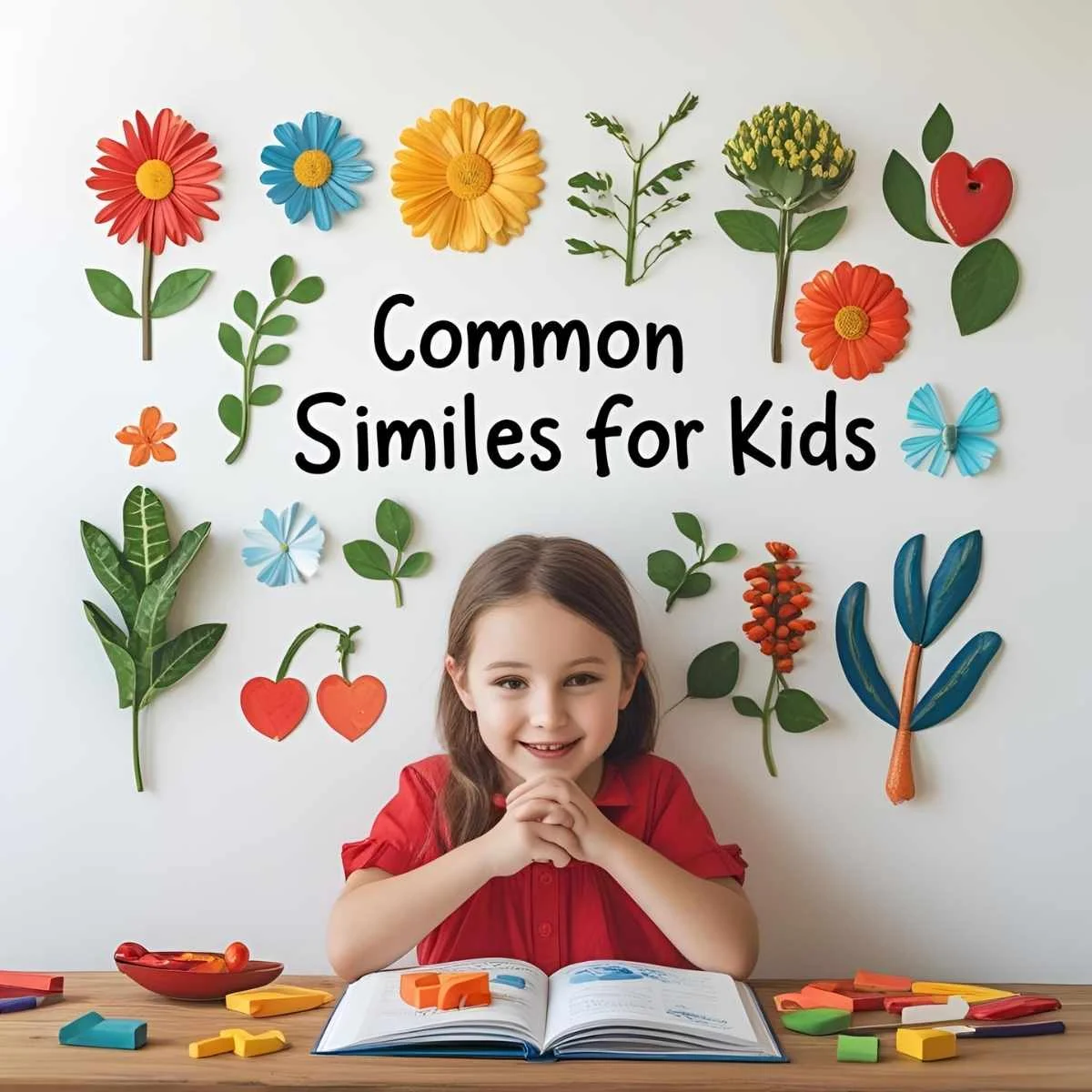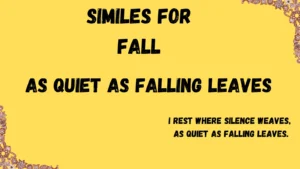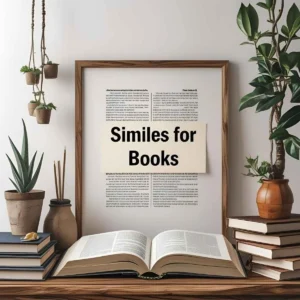Why Similes Are Magic for Kids 🪄
Similes are like colorful balloons, lifting words into fun and easy-to-understand pictures by comparing two things with “like” or “as.” They make stories, schoolwork, and chats more exciting by turning simple ideas into vivid images. Instead of saying, “He runs fast,” try “He runs like a cheetah!” Similes help kids describe their world—whether they’re playing, learning, or sharing feelings—in ways that sparkle. Perfect for bedtime stories, classroom projects, or playground banter, these comparisons are easy for kids to grasp and use. Ready to explore? Let’s dive into 25 common similes for kids, sorted by theme, to make their words shine! 🎉
Common Similes for Kids: 25 Playful Comparisons
These 25 similes capture the everyday adventures of kids—playing, learning, feeling, and connecting. Organized into thematic groups, each simile includes a meaning, a kid-friendly example, and a specific application for writing, speaking, or play. Let’s make words a playground!
Kids at Play 🏃
Similes for kids running, jumping, or having fun.
- Kids zoom like rockets, blasting across the playground.
Meaning: Kids move super fast, like rockets shooting into the sky.
Example: In a school story, “She zoomed like a rocket, racing to the slide first.”
Application: Use in a playground story or a kid’s journal, e.g., “I zoomed like a rocket in tag today!” - Kids bounce like balls, hopping with energy.
Meaning: Kids are full of lively movement, like balls bouncing around.
Example: In a gym class scene, “He bounced like a ball, jumping in the relay race.”
Application: Perfect for a PE class description or a shout-out during a game. - Kids flutter like butterflies, twirling in the park.
Meaning: Kids move lightly and gracefully, like butterflies dancing in the air.
Example: In a family picnic tale, “She fluttered like a butterfly, spinning in her dress.”
Application: Use in a poem about playtime or a caption for a park photo. - Kids scamper like squirrels, darting through games.
Meaning: Kids move quickly and playfully, like squirrels running up trees.
Example: In a backyard scene, “They scampered like squirrels, chasing each other in hide-and-seek.”
Application: Great for a story about outdoor fun or a note to parents about active kids. - Kids shine like stars, sparkling with excitement.
Meaning: Kids glow with joy, like stars twinkling in the night sky.
Example: In a birthday party story, “He shined like a star, opening his gifts.”
Application: Use in a party invitation or a kid’s thank-you note.
Kids in School 📚
Similes for kids learning, thinking, or working hard.
- Kids are sponges, soaking up new lessons.
Meaning: Kids absorb knowledge eagerly, like sponges soak up water.
Example: In a classroom scene, “She was a sponge, soaking up the teacher’s story about dinosaurs.”
Application: Use in a school report or a parent-teacher conference note, e.g., “He’s a sponge for math!” - Kids spark like matches, lighting up with ideas.
Meaning: Kids get sudden bursts of creativity, like matches catching fire.
Example: In an art class story, “His brain sparked like a match, drawing a wild dragon.”
Application: Perfect for an art project description or a class presentation. - Kids grow like plants, reaching for new facts.
Meaning: Kids learn steadily, like plants stretching toward sunlight.
Example: In a science fair tale, “She grew like a plant, learning about planets.”
Application: Use in a science journal or a teacher’s praise for effort. - Kids are builders, stacking knowledge like blocks.
Meaning: Kids piece together what they learn, like building with blocks.
Example: In a math class scene, “He was a builder, stacking math facts like blocks.”
Application: Great for a homework log or a speech about learning. - Kids hum like bees, buzzing with focus.
Meaning: Kids concentrate busily, like bees working in a hive.
Example: In a library scene, “They hummed like bees, reading their books quietly.”
Application: Use in a reading challenge post or a note about focus.
Kids with Feelings 😊😢
Similes for kids expressing emotions or connecting with others.
- Kids giggle like bubbles, popping with laughter.
Meaning: Kids laugh in bursts, like bubbles floating and popping.
Example: In a sleepover story, “She giggled like bubbles, hearing her friend’s joke.”
Application: Use in a funny story or a card to a friend, e.g., “You make me giggle like bubbles!” - Kids are rainbows, brightening after tears.
Meaning: Kids cheer up quickly, like rainbows after rain.
Example: In a family story, “He was a rainbow, smiling after a scraped knee.”
Application: Perfect for a comforting note or a story about resilience. - Kids hug like koalas, clinging with love.
Meaning: Kids show affection tightly, like koalas holding onto trees.
Example: In a bedtime scene, “She hugged like a koala, snuggling her mom.”
Application: Use in a family poem or a Mother’s Day card. - Kids shine like lanterns, glowing with kindness.
Meaning: Kids spread warmth, like lanterns lighting the way.
Example: In a classroom tale, “He shined like a lantern, helping his friend with homework.”
Application: Great for a thank-you note or a story about friendship. - Kids are kites, soaring with happy thoughts.
Meaning: Kids’ emotions lift them up, like kites in the wind.
Example: In a park scene, “Her dreams were kites, soaring as she shared her ideas.”
Application: Use in a journal about goals or a speech about positivity.
Kids with Friends 👭
Similes for kids in social moments or teamwork.
- Kids chatter like monkeys, swinging through conversations.
Meaning: Kids talk loudly and playfully, like monkeys in trees.
Example: In a lunchroom scene, “They chattered like monkeys, sharing lunchbox snacks.”
Application: Use in a story about recess or a caption for a group photo. - Kids stick like glue, staying close to buddies.
Meaning: Kids stay loyal to friends, like glue holds things together.
Example: In a playdate story, “She stuck like glue, playing with her best friend all day.”
Application: Perfect for a friendship card or a team project reflection. - Kids are puzzle pieces, fitting together in teams.
Meaning: Kids work well with others, like puzzle pieces forming a picture.
Example: In a group project, “They were puzzle pieces, building a cool volcano model.”
Application: Use in a class newsletter or a post about teamwork. - Kids bubble like soda, fizzing with group fun.
Meaning: Kids overflow with excitement in groups, like soda bubbles.
Example: In a party scene, “He bubbled like soda, laughing at the piñata game.”
Application: Great for a birthday story or a social media post about fun. - Kids dance like fireflies, twinkling in friend circles.
Meaning: Kids light up social moments, like fireflies glow at night.
Example: In a camp scene, “They danced like fireflies, sharing stories by the campfire.”
Application: Use in a camp journal or a post about summer memories.
Kids with Cultural Spark 🌍
Similes inspired by cultural or imaginative connections.
- Kids are drummers, beating with curious rhythms.
Meaning: Kids explore with eager energy, like drummers keeping a beat.
Example: In a museum story, “She was a drummer, tapping questions about ancient masks.”
Application: Use in a cultural field trip report or a speech about curiosity. - Kids weave like storytellers, spinning tales like yarn.
Meaning: Kids create imaginative stories, like storytellers weave tales.
Example: In a storytelling club, “He wove like a storyteller, making up a dragon adventure.”
Application: Perfect for a creative writing piece or a library event post. - Kids are painters, splashing ideas like colors.
Meaning: Kids express creativity vividly, like painters with bright colors.
Example: In an art show scene, “Her ideas were painters, splashing shapes on her canvas.”
Application: Use in an art class story or a caption for a kid’s artwork. - Kids glow like campfires, warming with family traditions.
Meaning: Kids carry cultural warmth, like campfires light up gatherings.
Example: In a holiday tale, “He glowed like a campfire, singing family songs.”
Application: Great for a family newsletter or a post about holiday fun. - Kids are explorers, digging like pirates for new ideas.
Meaning: Kids seek knowledge eagerly, like pirates hunt for treasure.
Example: In a science class, “She was an explorer, digging like a pirate for fossil facts.”
Application: Use in a science report or a speech about adventure.
Creative Examples to Spark Smiles 😄
These similes make kids’ lives pop with fun. “Kids zoom like rockets” captures the thrill of a playground race, perfect for a lively story. “Kids are sponges” shows a child soaking up a teacher’s tale, ideal for a school play. Ever think of yourself as a “bubble” fizzing with laughter? Try it in a birthday card! Which simile feels like your kid—do they scamper like squirrels or hug like koalas?
Try This: Pick a simile and write a sentence about your day, like “I bounced like a ball at recess!” Share it with a parent or friend for a giggle.
Practical Applications for Kids’ Words ✍️
These similes can make kids’ communication shine:
- Stories: Use “kids flutter like butterflies” in a tale about park adventures, e.g., “I fluttered like a butterfly, chasing bubbles.”
- Schoolwork: Add “kids are sponges” to a book report, showing how you soaked up a story.
- Cards: Write “You hug like a koala!” in a thank-you note to a family member.
- Playtime: Shout “We’re puzzle pieces!” during a team game to boost teamwork.
- Social Media: Post “Bubbling like soda at the party! 🥤” for a fun event photo.
Challenge: Rewrite a boring sentence like “I had fun” to “I bubbled like soda at the park!” Try it in a journal or tell a friend.
Conclusion: Let Kids’ Words Soar with Similes 🚀
Similes are like magic wands, turning kids’ words into fun, colorful pictures. From “rockets” zooming on the playground to “rainbows” smiling after tears, these comparisons make stories, schoolwork, and chats sparkle. Why not try one today? Write “I’m a star, shining in class!” in your notebook or share a simile with a buddy. Better yet, make your own—maybe “I’m a lion, roaring with ideas!” Kids, your words are a playground—jump in and play! 🌟



